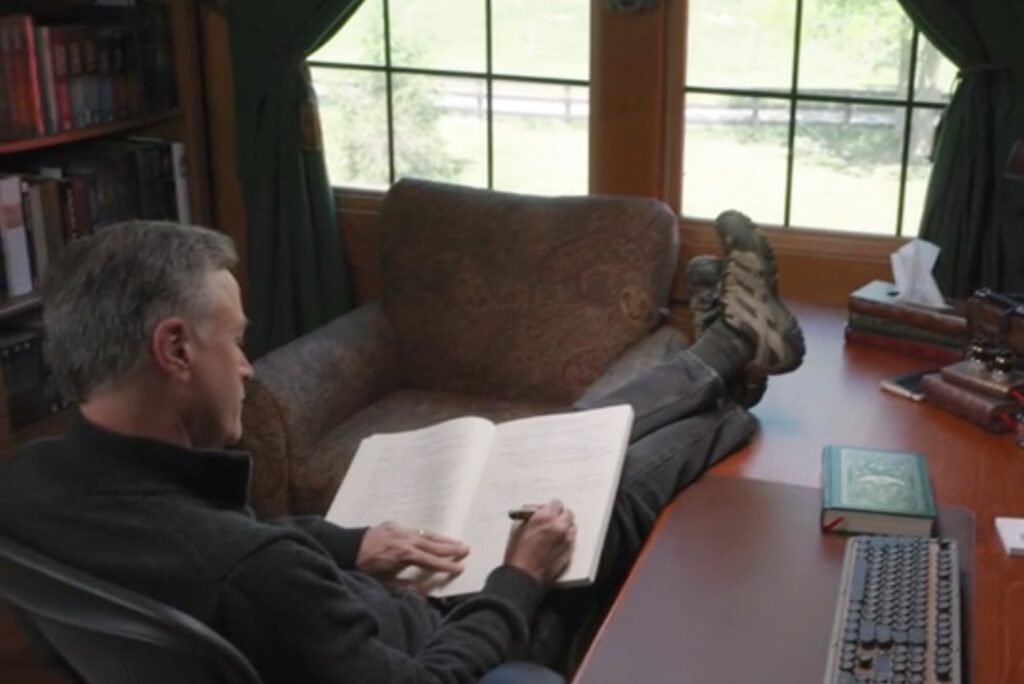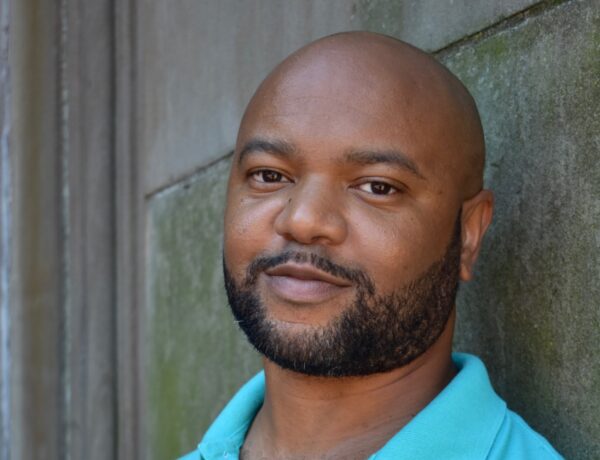Michael J. Sullivan is a New York Times, USA Today, and Washington Post bestselling author. After writing in various genres from 1979 to 1994 and receiving over 100 rejections, he quit writing creatively for almost a decade.
Eventually, he wrote a fantasy series for his daughter, which became his debut series, The Riyria Revelations. After self-publishing the series, it gained popularity and a foreign rights agent negotiated translations. The series was eventually picked up by Orbit, the fantasy imprint of Hachette Book Group, in 2010.
Each week, we publish a new daily writing routine from a famous author. Subscribe to our newsletter so you don’t miss out!
Hi Michael! We’re delighted to have you as a guest on Famous Writing Routines. For our readers who may not be familiar with your work, could you please give us a brief introduction to yourself?
Hello back, and thanks for having me. My name is Michael J. Sullivan and I write fantasy tales similar to The Lord of the Rings. I’m about to release my twentieth novel, and three of my books have been New York Times bestsellers. My debut series, The Riyria Revelations, was initially self-published and later picked up by Orbit (the fantasy imprint of big-five publisher Hachette Book Group). My other series include Legends of the First Empire, The Rise and Fall, and The Riyria Chronicles.
Can you tell us about your writing process and how it evolved over the years?
Well, when I first started, I was a stay-at-home dad, so writing centered around naptime for my two daughters combined with evening writing once my wife returned from her job. These days I’m a full-time writer, and my children are grown, so I now have the luxury of writing on my schedule, which generally means writing in the mornings and conceptualizing or editing in the afternoon. I’m rarely “writing” at night.
How did your experience as a self-published author influence your approach to writing and publishing?
I’ve self-published fifteen novels and traditionally published twelve. That adds up to more than twenty, but that’s because some of my works were re-released or a “mixed” release (where the publisher did the print version and I published the ebook and audio).
The writing itself is exactly the same in either case. I’ve even had my publisher hire my copyeditor because she’s already familiar with my voice and knows what’s a mistake and when I’m taking poetic license.
From a publishing perspective, I prefer self-publishing because it gives me greater control. When traditionally published, I don’t get a say about designs, pricing, or format.
How do you think your experience with rejection and self-publishing has shaped your writing style and approach to your craft?
Rejection almost killed any chance at a writing career. I spent about a decade riding the “query-go-round,” and after getting nowhere, I stopped writing altogether. I found the process painful, and it took all joy from penning my tales.
After about a decade’s hiatus, I did start writing again, but it was only on the condition that I wouldn’t publish. Writing that way was a significant breakthrough because I was writing books I wanted to read instead of books I thought could get published. Ironically, those stories were eventually published, and my career took off from there.
A small press initially published my debut, and while they were well-intentioned, that venture didn’t earn me a dime nor grow my readership. But when the rights reverted, I started self-publishing, and having total control made a big difference. The writing style didn’t change, but the “packing” did as well as the ability to release books more quickly. Having two books released yearly rather than one made it much easier to maintain momentum.
Discover the daily writing habits of authors like Stephen King, Neil Gaiman, and Gillian Flynn with Famous Writing Routines Vol. 1 and learn how to take your writing to the next level. Grab your copy today!
Can you talk about your experience of being a New York Times, USA Today, and Washington Post bestselling author? How has it impacted your writing career?
Well, reaching bestseller lists is always the dream, isn’t it? But I never thought it would happen to me. Typically, my books are what I would call “a slow burn,” meaning they don’t come out of the gate like gangbusters, but the readers find them over time, and they are like the Energizer bunny in that they keep going, and going, and going.
Bestselling lists depend on many sales in a very short time (usually a week but in some cases a month), so the chance of hitting them (given my standard sales trajectory) wasn’t likely. I figured if I had a chance, it would be with the release of a middle book of a series that was selling well, and that’s what happened with my first New York Times bestseller, Age of War (Book #3 of the Legends of the First Empire). Recently, I did hit the bestseller list with the first title in a series (Nolyn – Book #1 of Rise and Fall), and to be honest, I was surprised when it “hit.”
As for how it affects my career is difficult to say. Seeing “New York Times Bestselling Author” on a book’s cover certainly adds some “street credibility,” so I think it should help sales, but it’s impossible to know how much weight a buyer puts into that. I don’t think of myself any differently since reaching those accolades.
I’d love to learn more about your daily writing routine. Can you take us through a recent day in your writing life?
Well, you first need to know that every day is like the one before. I’ve developed a routine, and I don’t deviate from it. It starts around 6:45 – 7:00 in the morning. I get up, have coffee and something to eat, then spend a few minutes reading the newspaper.
I’m usually at my desk around 8:00 or 8:30, and I start by reading a few pages of an author whose work I enjoy (right now, it’s Stephen King), which gets my “head in the right place. Generally, I’ll start by editing whatever I wrote the day before, and then I’ll keep going.
I’ll write until lunch, which will depend on how the writing goes. Sometimes it’s at noon, other days it could be 2:00. I used to write 2,000 words a day, but these days, it’s more like 1,400 – 1,500.
Around 4:00, I’ll return to “writing activities,” but that doesn’t mean adding words to the manuscript. If I have a book that’s coming up on release, I usually spend this time doing my final read-through or incorporating changes from the copy editor. If I don’t have any prior book responsibilities, then I spend that time conceptualizing for the next day, researching, or working on solutions to various plot issues.
Dinner is at 6:30 or 7:00; from then on, there usually isn’t any other writing for the day. I’ll spend that time responding to emails or reading for pleasure. I’m generally in bed around 10:30 or so.
Wow, all that sounds boring, but for me, it’s not. Generally speaking, writing (or plotting) is what I love to do the most.
What specific strategies or techniques do you use to overcome writer’s block or any other obstacles in your writing process?
I’m sure your readers will hate to hear me say that I’ve never really had “writer’s block.” Do I have times when I don’t know what’s going to happen next? Sure. But they are generally short-lived, and when I’m figuring out what happens next, I’m playing out scenarios (plotting), and that’s just as important as adding words to the book.
As for techniques, I find doing “mundane” tasks help – like going for a walk, bike riding, or cutting the grass. It’s good to have my body engaged but my mind free to wander. I also will talk to myself (and out loud). There is something about engaging the vocal processing part of my brain that helps me.
So I’ll act like an interviewer, ask myself questions, and then come up with answers. That usually helps me figure out where the story is going, and then it’s easy to rush back to my office to jot down notes for the next writing session.
How has your writing routine and process changed over the years?
As I mentioned, my writing routine was pretty “catch as catch can” – having to steal time at the keyboard whenever I could. Now I can write whenever I want, which means doing so between waking up and lunch.
What does your writing workspace look like?
My writing space is critical to my process. It has to be quiet – deathly quiet. We used to live in the suburbs (in a condominium), and having landscapers outside cutting grass, kids playing, or people coming and going was a huge distraction. Now I live in the country, and while even bird noises will still bother me, it’s a lot better than it once was.
The position of my desk is also crucial. I can’t have the door to my back, nor can my desk face a window, but having a window to look out at just the turn of my head is perfect. My desk is large and uncluttered. If I pull out a notebook to jot something down, it goes directly back to its permanent place after I’m done.
The overall size of the office has to be on the “smallish side.” I like it “cozy” rather than expansive. I need to have books around me and a few comfortable chairs. But I have no use for a couch. Here’s a picture.

Affiliate disclaimer: Some links on this website are affiliate links. We may earn a small commission if you make a purchase through these links, but only promote products we truly believe in. We disclose affiliate links and give honest reviews.



No Comments